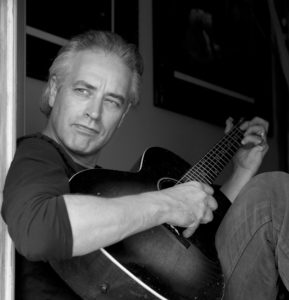John Wesley Harding
Like many of his Appleseed label-mates, John Wesley Harding is an inveterate and ingenious multitasker, combining twin careers as an acerbic and articulate “gangsta folk” (his term) singer-songwriter and an acclaimed novelist. On his CDs, he juggles musical styles that include sharp, witty originals, traditional folk songs, even his own convincing imitations of old ballads. Acoustic, electric, a cappella, solo or with a full band, the man known as “Wes” has covered a lot of territory with no signs of slowing.
He started out as Wesley Stace (and remains so for his writing duties), born in Hastings, England, in 1965 to a mother who taught singing and a father who was a classics scholar. Then there was pop music – the Beach Boys, David Bowie – for him to listen to. And then there was Bob Dylan, whose songs changed 14-year-old Wes’s life (and future performing name).
After completing his degree in English Literature at Cambridge University, Wes yielded to the call of songwriting and performance, crafting his own music and pomposity-puncturing stage presence. A subsequent move to London thrust him before larger audiences as the opening act for such diverse artists as John Hiatt, Hothouse Flowers and Ted Hawkins.
Signed by the UK’s Demon Records, ironically the home of Elvis Costello, to whom Harding was initially compared, Wes and his manager made the strategic “mistake” of his recording his first album, It Happened One Night, at a live show: “I’d done a total of about thirty gigs before I recorded my debut album; the songs were live, so no one wanted to play them on the radio; I was writing a lot at the time, so I was bored of these songs by the time it came to record Here Comes the Groom (his first US release and second CD overall, described in the L.A. Times as “the first great rock album on the ’90s”).
It Happened One Night did serve to establish Harding as a worthy link in the chain of personally aware, politically conscious, and painfully observant modern songwriters that connects Dylan, Springsteen, Costello, Bragg and a shortlist of others. Critics were quick to notice: “His eloquence can be gut-wrenching. [The album] captures something you won’t find … almost anywhere else: the sheer joy of performing” (Creem).
After recording many of the studio tracks that subsequently appeared as the second half of It Happened One Night & It Never Happened At All, the expanded 2-CD reissue released by Appleseed in 2004, Wes signed with Sire Records in the US and found his career escalating with three consecutive high-profile CDs (Here Comes the Groom, The Name Above the Title and Why We Fight, the latter produced by Steve Berlin of Los Lobos), and tours of his new home, the United States, as a headliner or supporting such prestigious artists as Michelle Shocked, The Band, and Joan Baez. Robert Hilburn, the respected music writer for The Los Angeles Times, dubbed Harding “one of the great rock artists of the ’90s.” Why We Fight caught the attention of Bruce Springsteen, and Harding was eventually handpicked to open shows on The Boss’s 1995 Ghost of Tom Joad solo tour – Springsteen’s first opening act since 1978.
Throughout the ’90s, Wes stayed busy in recording studios and on the road. In 1992, Rhino belatedly released It Happened One Night in the US (in its original form, with two fewer live songs than our version, and no second disc), and John Wesley Harding’s New Deal in 1996. In 1998, Wes and “power pop” musician/friend/New Deal producer Chris von Sneidern recorded Awake for the Zero Hour label, then tabled new Harding originals to record 1999’s Trad Arr Jones, a tribute to the repertoire and arrangements of accident-incapacitated British folksinger and guitarist Nic Jones. Awake and Trad Arr Jones were both reissued by Appleseed in 2000 in remastered and expanded form, with Awake: The New Edition gaining a 1994 live duet between Harding and Springsteen on Bruce’s “Wreck on the Highway” among its bonus tracks.)
One of Harding’s own songs on Awake, “Miss Fortune,” served as the inspiration for his debut as an author, with Wes expanding a five-minute song into Misfortune, a 500-page historical novel set in the 19th Century and published in April 2005 in the US and many other countries. Reviews were numerous and positive. To create a separate soundtrack for the book, Wes convened The Love Hall Tryst, an a cappella quartet also including solo artists Kelly Hogan and Nora O’Connor and actor Brian Lohmann, to record 2005’s Songs of Misfortune, a collection of traditional British folk songs and song fragments uncovered and adapted by Harding, as well as some camouflaged original compositions and an apposite Leonard Cohen song, “Joan of Arc.” The group played a handful of delightful shows before its members went their separate ways.
New Harding recordings have been slow to arrive recently (although a new one with The Minus 5 is due soon), but with good reason: Wes’s second novel, by George, the multigenerational story of a performing British family and their ventriloquist’s dummy, was published in August 2007 and confirmed Harding as an unpredictable and original new voice in literature.
Singer, songwriter, musical interpreter, novelist – Harding’s talents and intelligence assure him an audience in whatever media he chooses. Watch for him on tour, listen to his recordings, read his books, and, as one of his previous CDs suggests, trust the name above the title, whether it’s “Harding” or “Stace.” In the words of his signature song, “The Devil in Me,” Harding shares his creative secret: “It all seems just like human behavior to me.”
Showing the single result


